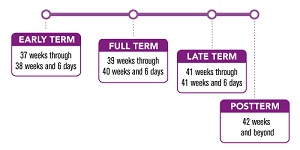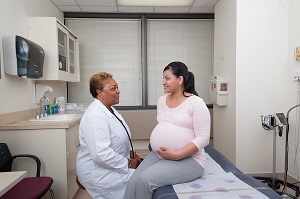 Catherine Y. Spong, M.D.
Catherine Y. Spong, M.D.
Associate Director for Extramural Research
Eunice Kennedy Shriver National Institute of Child Health and Human Development (NICHD)
National Institutes of Health
U.S. Department of Health and Human Services
As a mother and OB-GYN, I’m not only privileged to have four children of my own, but I’ve shared in the joy when my patients deliver their own babies.
As my patients reached the last few weeks of their pregnancies, when they were so eager to meet their babies and could see the “finish line,” sometimes they asked, “Why do the last few weeks really matter? Isn’t the baby just fattening up?”
This is an important question that has caused confusion for some time. Research has shown that the last few weeks of pregnancy make a difference for the baby’s health. During weeks 37 and 38, the brain forms connections that will be important for coordination, movement, and learning. Babies born at 37 and 38 weeks are more likely to spend time in the neonatal intensive care unit (NICU), are at a higher risk for blood infections, and can have problems with breathing, feeding, and controlling their temperature. They may also be at higher risk later in life for learning problems and difficulties with vision and hearing. We know from experience and research that babies born at or after 39 weeks have the fewest complications.
By definition, a baby born anytime between 37 weeks and 42 weeks is considered “term.” However, because of the health risks to the baby before 39 weeks, the Eunice Kennedy Shriver National Institute of Child Health and Human Development (NICHD) provided a forum in December 2012 with health care provider groups worldwide to discuss the “Definition of Term.” This forum and communication within the maternal and child health field resulted in a Journal of the American Medical Association (JAMA)article that outlined new definitions:
- Early term: Babies born at 37 weeks and 38 weeks
- Full term: Babies born in weeks 39 and 40
- Late term: Babies born in week 41
- Postterm: Babies born at 42 weeks and later
 These definitions were endorsed by the American College of Obstetricians and Gynecologists, the Society for Maternal-Fetal Medicine, and the Association of Women’s Health, Obstetric, and Neonatal Nurses.
These definitions were endorsed by the American College of Obstetricians and Gynecologists, the Society for Maternal-Fetal Medicine, and the Association of Women’s Health, Obstetric, and Neonatal Nurses.
Help us spread the word that a baby is not “full term” until 39 weeks of pregnancy. If you have questions, talk to your health care provider about what the new full-term pregnancy definition means for you. Learn more about the new full-term pregnancy definition from the Know Your Terms Initiative.
Follow our latest articles on HMHB.org, join us on the parenting journey, one of life’s greatest and most rewarding challenges.
